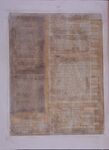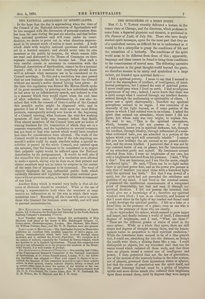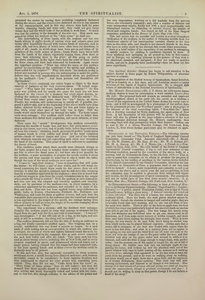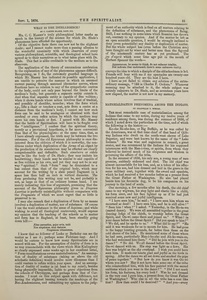 |
vol. title: Miscellaneous Scraps from January 1st 1878 vol. period: 1875-1878 pages in vol.: 153 |
< Indian Mediums and Manifestations (continued from page 5-59) >
...
Have the Lower Animals Souls?
“There is life in the old dog yet.” |
Sir,—I have been struck with Georgina Weldon’s statement that in the dusk of the evening, her nurse and a pupil walking in her garden, saw the spirit of her old dog “walking towards his grave.” This reminds me of the statement made by Mr. Home to the committee of the Dialectical Society, as given in page 193 of the Report. On his being asked if he had seen the spirit of a lower animal—“the spirit of a dog, for instance”—replied “No,” but that he had seen birds; and said again, in reply, that “the power is limited to living things, I have seen a flower; it disappeared.”
Here, then, we have the belief in spirits extended to all living forms, if not to all objects; not only a spirit enclosed in all bodies, the source of all power, thought, instinct, and action, as supposed by Bacon, but actual spirits. Bacon affirmed that animals reasoned, and gave instances of it, as Mr. Darwin has done; and not only so, but Bacon even assigned to them imagination, as in the following remarkable passage from the Natural History:—
“The insects,” he writes, “have voluntary motion, and therefore imagination; and whereas some of the ancients have said that their motion is indeterminate, and their imagination indefinite, it is negligently observed, for ants go right forward to their hills, and bees do (admirably) know the way from a flowery heath, two or three miles off, to their hives. It may be gnats and flies have their imagination more mutable and giddy, as small birds likewise have, . . . and though their spirit be diffused, yet there is a seat of their senses in the head.”
On the other hand, Descartes supposed that the lower animals did not possess conscience or feeling at all, and that their lives were purely automatic, a question which Professor Huxley has been discussing very lately, and, of course, it is a very deeply interesting matter in respect to the cruelty to animals, as also in respect to the whole plan of nature. Judge Holmes, in his great work, says: “A fabulous opinion is still prevalent that man only (and some would even leave out the lower races of men as well as the higher apes) has a soul. It is based upon certain foggy, mystical, and obscure notions of the Biblical revelation, and means only that man alone has such a soul as can be saved and go to Heaven.” Now, any spirit, one would think, ought to be able to settle this question, though it might be that the lower animals have a different sphere of existence from man, supposing that they have a future at all.
Henry G. Atkinson, F.G.S.
Boulogne-sur-Mer, July 27th, 1876.
An Extraordinary Story
An Extraordinary Story.—The following is from A Study of Hawthorne, by George Parsons Lathrop, (Boston: Osgood and Co.; London: Trubner):—“A pedler, named Dominicus Jordan, was to-day in Uncle Richard’s store, telling a ghost story. I listened intently, but tried not to seem interested. The story was of a house, the owner of which was suddenly killed. Since his death, the west garret window cannot be kept closed; though the shutters be hasped and nailed at night, they are invariably found open next morning, and no one can tell when or how the nails were drawn. There is also on the farm an apple-tree, the fruit of which the owner was particularly fond of, but since his death no one has been able to get one of the apples. The tree hangs full nearly every year, but whenever any individual tries to get one, stones come in all directions, as if from some secret battery or hidden catapult, and more than once have those making the attempts been struck. What is more strange, the tree stands in an open field, there being no shelter near from which tricks can be played without exposure. Jordan says that it seems odd to strangers to see that tree loaded with apples when the snow is four feet deep; and what is a mystery there are no apples in the spring, no one ever sees the wind blow one off, none are seen on the snow, nor even the vestige of one on the grass under the tree; and that cluldren may play on the grass, under and around it, while it is in blossom, and until the fruit is large enough to tempt them, with perfect safety; but the moment one of the apples is sought for, the air is full of flying stones. He further says that late one starlight night, he was passing the house, and looking up, saw the phantom walk out of the garret window with cane in hand, making all the motions as if walking on terra firma, although what appeared to be his feet were at least six yards from the ground; and so he went on walking away on nothing, and when nearly out of sight, there was a great flash, and an explosion as of twenty field-pieces, then—nothing. This story was told with seeming earnestness, and listened to as though it was believed. How strange it is that almost all persons, old and young, are fond of hearing about the supernatural, though it produces nervousness and fear! I should not be willing to sleep in that garret, though I do not believe a word of the story.”
What is the Intelligence?
Mr. C. C. Massey’s truly philosophical letter marks an epoch in the history of the science for which Dr. Slade’s phenomena have afforded the opportunity.
Of the objective facts there can now not be the slightest doubt; and I cannot make more than a passing allusion to the wonderful unanimity with which observers of every various philosophical, scientific, and theological school have agreed as to their narratives as to what takes place with Dr. Slade. This fact is alike creditable to the medium as to the observers.
The application of the theory of unconscious cerebration to the explanation of any of the phenomena appears difficult. Recognising, as I do, the extremely guarded language in <... continues on page 5-61 >
Editor's notes
- ↑ Have the Lower Animals Souls? by Atkinson, H. G., London Spiritualist, No. 206, August 4, 1876, pp. 9-10
- ↑ An Extraordinary Story by unknown author, London Spiritualist, No. 206, August 4, 1876, p. 5
- ↑ What is the Intelligence? by Blake, C. C., London Spiritualist, No. 210, September 1, 1876, p. 51
-
London Spiritualist, No. 206, August 4, 1876, pp. 9-10
-
London Spiritualist, No. 206, August 4, 1876, p. 5
-
London Spiritualist, No. 210, September 1, 1876, p. 51


